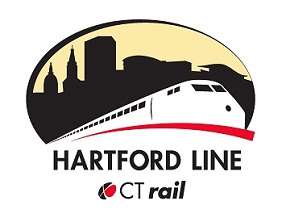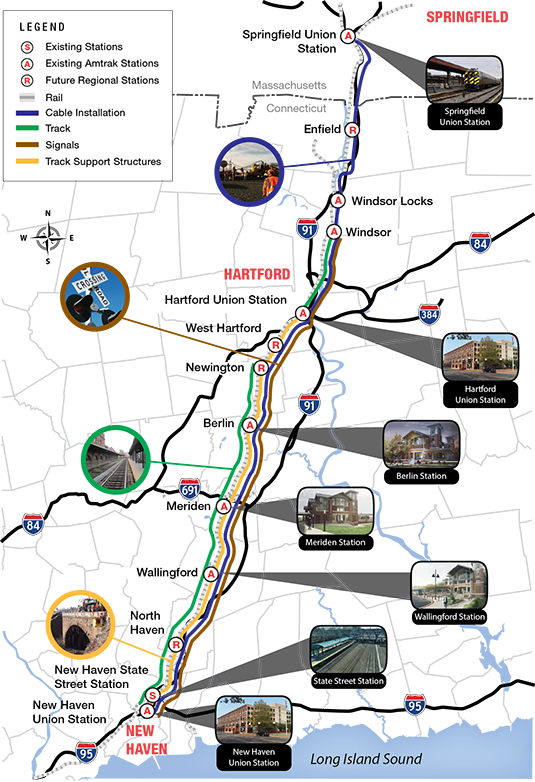Construction of New Rail Stations Set to Begin in 3 Connecticut Communities
/The start of construction is imminent this fall for new rail stations in Wallingford, Meriden and Berlin as part of the New Haven-Hartford-Springfield (NHHS) Rail Program. The new, expanded commuter service, to debut in 2016, will be branded the “Hartford Line,” as a key component of an increasingly robust multi-modal regional transportation system being developed in the state and region.
Improvements at the three stations include high-level platforms on both sides of the track, overhead pedestrian bridge with new elevators and stair towers, platform snow melt systems, electric vehicle charging stations, ticket vending machines and passenger information display systems, high-resolution video surveillance systems, increased parking capacity and roadway access improvements, improved accessibility and bicycle racks.
Funded through the Passenger Rail Investment and Improvement Act (PRIIA) created under President Barack Obama in 2008, and State of Connecticut bonds proceeds, the NHHS Rail Program is aimed at providing significant new regional passenger rail service options. Existing stations on the Hartford line are in New Haven, Wallingford, Meriden, Berlin, Hartford, Windsor Locks and Springfield. Plans call for future stations in North Haven, Newington, West Hartford and Enfield. 
Officials point out that one of the primary objectives of the NHHS program is to serve as a catalyst for transit-oriented development (TOD) around the stations. The state Department of Transportation is working with towns to help leverage the investment in railroad infrastructure to capture local development benefits. TOD, in the form of compact, mixed-use districts, is pedestrian-friendly and contributes to vibrant and active communities. By promoting the use of transit, TOD also reduces reliance on automobiles, resulting in energy cost savings and improved air quality.
In June, officials from the U. S. Department of Transportation’s Federal Railroad Administration (FRA) toured parts of the NHHS Rail corridor, and state officials recently visited a proposed rail station site in Enfield.
The new NHHS rail service is expected to operate at speeds up to 110 mph, cutting travel time between Springfield and New Haven to as short as 79 minutes. Travelers will be able to board trains every 45 minutes during the morning and evening peak hours and every 90 minutes during off-peak periods when the new system is operational.
A year ago, a West Haven rail station was added to the New Haven line. Located midway between Milford and New Haven stations, West Haven was the first new station to open on the New Haven Line since Fairfield Metro Station was added in 2011. West Haven Station was designed by Vanasse Hangen Brustlin and built by a Connecticut company, Manafort Brothers of Plainville.
A New York City-based construction firm, Judlau Construction, has been awarded the $58.8 million contract to build the new railroad stations in Berlin, Meriden and Wallingford, the New Haven Register reported last month. The firm specializes in large public works projects and design-build services, and currently ranks #132 on Engineering News Record’s list of the Top 400 Contractors, as well as #32 among Top Domestic Heavy Contractors. (In 2011, the company ranked #113 on the Top 400 list and #33 on the Top Domestic Heavy Contractors list.)
In June, the Chicago Tribune reported that the company was being awarded a $64 million construction contract by Illinois Tollway as low bidder for construction of new highway entrance ramps. The Tribune also reported that Judlau “admitted improper hiring practices and paid a $7.5 million penalty in connection with an alleged minority hiring scheme” in New York, which the company said it had “self-reported” to the U.S. Attorney’s office. The Tribune reported that “according to a 2012 civil lawsuit settlement with the U.S. attorney's office, Judlau and its partner in a Metropolitan Transportation Authority tunnel project admitted engaging in improper hiring practices involving minority- and women-owned businesses, otherwise known as disadvantaged business enterprises, or DBEs.”
































